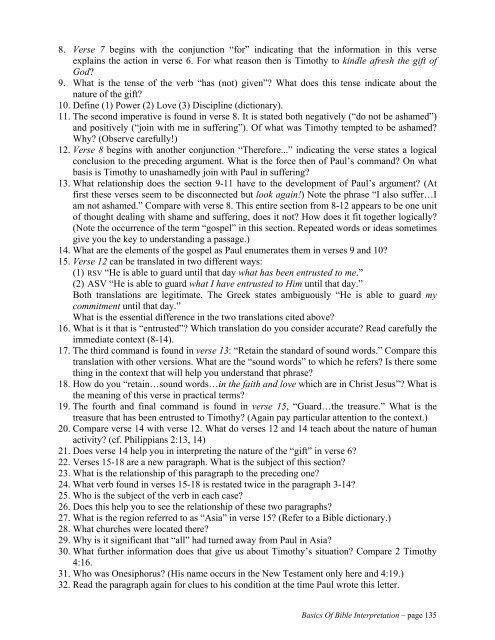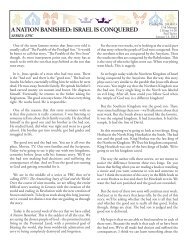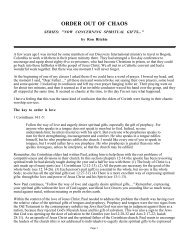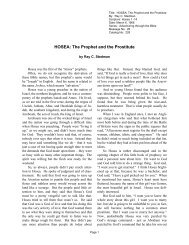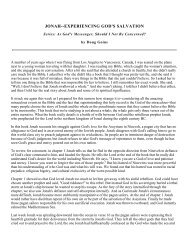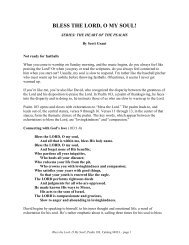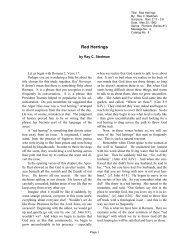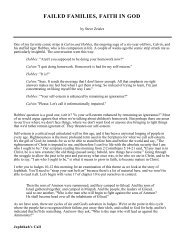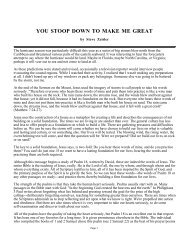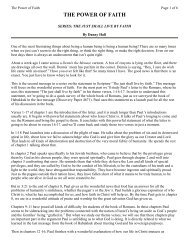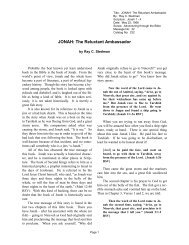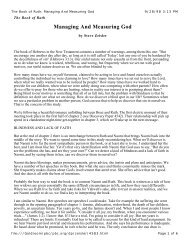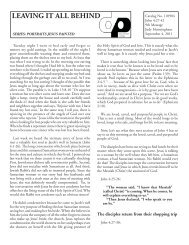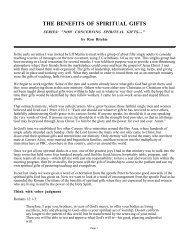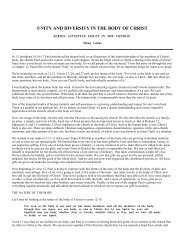Basics of Bible Interpretation - RayStedman.org
Basics of Bible Interpretation - RayStedman.org
Basics of Bible Interpretation - RayStedman.org
Create successful ePaper yourself
Turn your PDF publications into a flip-book with our unique Google optimized e-Paper software.
8. Verse 7 begins with the conjunction “for” indicating that the information in this verse<br />
explains the action in verse 6. For what reason then is Timothy to kindle afresh the gift <strong>of</strong><br />
God?<br />
9. What is the tense <strong>of</strong> the verb “has (not) given”? What does this tense indicate about the<br />
nature <strong>of</strong> the gift?<br />
10. Define (1) Power (2) Love (3) Discipline (dictionary).<br />
11. The second imperative is found in verse 8. It is stated both negatively (“do not be ashamed”)<br />
and positively (“join with me in suffering”). Of what was Timothy tempted to be ashamed?<br />
Why? (Observe carefully!)<br />
12. Verse 8 begins with another conjunction “Therefore...” indicating the verse states a logical<br />
conclusion to the preceding argument. What is the force then <strong>of</strong> Paul’s command? On what<br />
basis is Timothy to unashamedly join with Paul in suffering?<br />
13. What relationship does the section 9-11 have to the development <strong>of</strong> Paul’s argument? (At<br />
first these verses seem to be disconnected but look again!) Note the phrase “I also suffer…I<br />
am not ashamed.” Compare with verse 8. This entire section from 8-12 appears to be one unit<br />
<strong>of</strong> thought dealing with shame and suffering, does it not? How does it fit together logically?<br />
(Note the occurrence <strong>of</strong> the term “gospel” in this section. Repeated words or ideas sometimes<br />
give you the key to understanding a passage.)<br />
14. What are the elements <strong>of</strong> the gospel as Paul enumerates them in verses 9 and 10?<br />
15. Verse 12 can be translated in two different ways:<br />
(1) RSV “He is able to guard until that day what has been entrusted to me.”<br />
(2) ASV “He is able to guard what I have entrusted to Him until that day.”<br />
Both translations are legitimate. The Greek states ambiguously “He is able to guard my<br />
commitment until that day.”<br />
What is the essential difference in the two translations cited above?<br />
16. What is it that is “entrusted”? Which translation do you consider accurate? Read carefully the<br />
immediate context (8-14).<br />
17. The third command is found in verse 13: “Retain the standard <strong>of</strong> sound words.” Compare this<br />
translation with other versions. What are the “sound words” to which he refers? Is there some<br />
thing in the context that will help you understand that phrase?<br />
18. How do you “retain…sound words…in the faith and love which are in Christ Jesus”? What is<br />
the meaning <strong>of</strong> this verse in practical terms?<br />
19. The fourth and final command is found in verse 15, “Guard…the treasure.” What is the<br />
treasure that has been entrusted to Timothy? (Again pay particular attention to the context.)<br />
20. Compare verse 14 with verse 12. What do verses 12 and 14 teach about the nature <strong>of</strong> human<br />
activity? (cf. Philippians 2:13, 14)<br />
21. Does verse 14 help you in interpreting the nature <strong>of</strong> the “gift” in verse 6?<br />
22. Verses 15-18 are a new paragraph. What is the subject <strong>of</strong> this section?<br />
23. What is the relationship <strong>of</strong> this paragraph to the preceding one?<br />
24. What verb found in verses 15-18 is restated twice in the paragraph 3-14?<br />
25. Who is the subject <strong>of</strong> the verb in each case?<br />
26. Does this help you to see the relationship <strong>of</strong> these two paragraphs?<br />
27. What is the region referred to as “Asia” in verse 15? (Refer to a <strong>Bible</strong> dictionary.)<br />
28. What churches were located there?<br />
29. Why is it significant that “all” had turned away from Paul in Asia?<br />
30. What further information does that give us about Timothy’s situation? Compare 2 Timothy<br />
4:16.<br />
31. Who was Onesiphorus? (His name occurs in the New Testament only here and 4:19.)<br />
32. Read the paragraph again for clues to his condition at the time Paul wrote this letter.<br />
<strong>Basics</strong> Of <strong>Bible</strong> <strong>Interpretation</strong> – page 135


